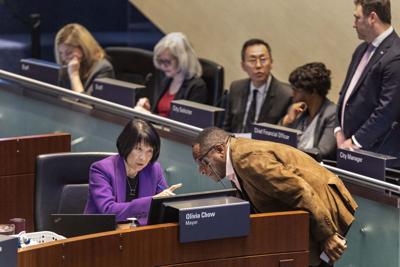New Tesla owners in Toronto’s vehicle-for-hire sector will no longer be allowed to get their permits and licences subsidized as long as Canada remains under economic threat from the U.S.
Starting March 1, the city will temporarily restrict new Tesla cars from registering in its ,¬†which is meant to incentivize¬†taxicab and limousine owners to get a zero-emission vehicle before 2030. Under this program, which doesn’t include private transportation companies such as Uber and Lyft, owners can get their fees reduced at varying rates until 2029 when they apply for a licence or renewal.
According to the motion put forward by Mayor Olivia Chow during Tuesday’s budget debate and passed by council, all other types of zero-emission vehicles, including electric vehicles and other American brands, can still qualify for the program.
“For now, the best we can do is send a message to the White House,” Chow said at council, referencing the ongoing trade war that U.S. President Donald Trump has ignited with Canada and Mexico.
One of the owners of the Tesla brand, and current CEO, is Elon Musk who is also part of the Trump administration’s newly created¬†Department of Government Efficiency which is tasked with dramatically slashing the U.S. federal¬†government. Its work has been opaque and controversial.
Chow acknowledged that, at the municipal level, there isn’t much they can do to separate itself completely from the U.S., given most of the significant measures would need to come from the provincial and federal governments. But Tuesday’s decision is meant to be part of the city’s patriotic measures to respond to what Chow has repeatedly referred to as Trump‚Äôs “senseless” trade war.
Here are the top figures that make up this year’s budget.
Here are the top figures that make up this year’s budget.
At last week’s city council meeting, members unanimously approved a plan for a ‚Äúcomprehensive, multi-faceted ‚ÄėBuy Local, Buy Canadian‚Äô campaign‚ÄĚ that would encourage residents and businesses to purchase ‚Äúlocally made Canadian goods and services.‚ÄĚ
While most electric cars are considered zero-emission vehicles, the latter refers specifically to any car that produces zero tailpipe emissions. Electric vehicles can still have some level of emissions, depending on its power source.
The rollout of Chow’s Tesla motion, meanwhile, caused some confusion through the day.
At a press conference before council met at city hall, Chow told reporters it would ban Teslas from city subsidies, including for purchasing a Tesla. , British Columbia and Quebec are the only two Canadian provinces to currently offer a subsidy or rebate for purchasing or leasing an electric vehicle.
“People can still continue to buy electric vehicles,” Chow said ahead of the council meeting. “I see no reason why the city should subsidize the purchase of Teslas.”
Chow also cited millions in grants the city offers to eligible taxi owners to buy electric vehicles. “Feel free to buy them, but no reason that we should pay $4.85 million in grants,” she had said.
However, as of Feb. 11, there are 21 zero-emission taxicab and limousine owners getting fee reductions and of that, nine owners use a Tesla (one taxicab and eight limousines), said city spokesperson Shane Gerard.
That means providing licensing fee reductions to all nine Tesla owners amounts to $4,677 in forgone revenue for the city since the program started last year, not millions.
“It’s very small,”¬†Chow said later at council. “It’s a modest impact but it certainly, hopefully, will send a message.”
In a media scrum during council‚Äôs lunch break, budget chief Shelley Carroll had said she was not sure what the final version of the motion would say, adding that it “might not” even be debated Tuesday because the way it was being pitched to council was outside of municipal jurisdiction.
”(The city) is mostly in the business of creating charging stations for all manner of electric vehicles, no matter who manufactures them,”¬†Carroll said at lunch.
The city  some cost-covering measures to help offset the expense of installing electric vehicle-charging infrastructure in multi-unit residential buildings and workplaces.
When asked by reporters whether the mayor misspoke earlier, Carroll said during the midday break: “I think maybe the research was still being developed and still is at this point.”
The $18.9-billion spending plan for 2025 includes increased investments for transit, housing, emergency services, libraries and school meals. 
The $18.9-billion spending plan for 2025 includes increased investments for transit, housing, emergency services, libraries and school meals. 
The city has an official goal‚ÄĮof reducing its greenhouse gas emissions produced by the vehicle-for-hire industry to net zero by 2030. Council voted in 2023 on a number of measures to help accomplish this. They include requiring all vehicles-for-hire to produce zero emissions starting in 2030 (with some exceptions), and granting varying fee reductions to licences and renewals starting in 2024 and running to 2029.
The other car brands registered under this fee reduction program currently include 10 Cadillac vehicles (American), one Hyundai (South Korean) and one Nissan (Japanese), said Gerard.
When prompted by Coun. Brad Bradford at council why the city shouldn’t eliminate all American motor companies from getting this fee reduction, Chow said she sees “no reason to punish workers of Toronto.”
Deputy Mayor and Coun. Mike Colle said in an interview he wants to get rid of the Tesla dealership in his Eglinton-Lawrence ward on Dufferin Street, one of two locations in pc28ĻŔÕÝhousing a Tesla facility.¬†
“The owner of Tesla is the second most powerful man in the Trump administration who is hell-bent on destroying the Canadian economy with punishing tariffs,” Colle said.

































To join the conversation set a first and last name in your user profile.
Sign in or register for free to join the Conversation